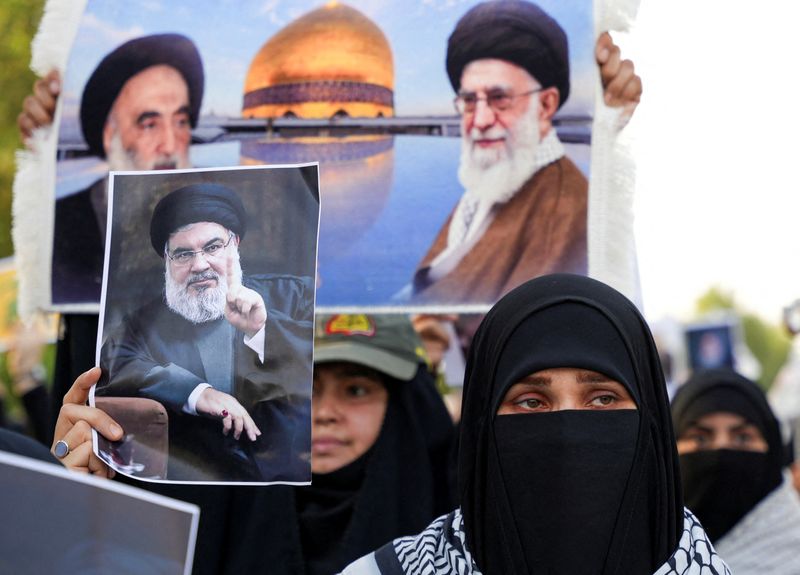
By Jaidaa Taha
CAIRO (Reuters) – Israel’s killing of Hezbollah chief Sayyed Hassan Nasrallah was met with silence by many Sunni-led states across the region, showcasing the split between populations outraged at Israel and authorities who normalised ties with Israel or are opposed to Hezbollah’s patron Iran.
Nasrallah, who led the powerful Shi’ite armed group for 32 years, made regional enemies beyond Israel and the West. Gulf countries and the broader Arab League designated his group a “terrorist organization” in 2016, although the League retracted the designation earlier this year.
Sunni-ruled Saudi Arabia said in a statement late on Sunday that it is following the developments in Lebanon with “grave concern”, and urged the preservation of the sovereignty and regional security of Lebanon. But it made no mention of Nasrallah.
And Sunni-ruled states Qatar, the United Arab Emirates and Bahrain have stayed completely quiet on Nasrallah’s killing. The UAE and Bahrain normalised ties with Israel in 2020, and Bahrain quashed a sizeable pro-democracy uprising by its Shi’ite community in 2011.
The Bahraini pro-Iran LuaLua TV, however, broadcast videos showing modestly sized marches which it said were in mourning for Nasrallah. The channel said the Bahraini regime “attacked” demonstrators and detained some of them.
The Bahraini opposition website Bahrain Mirror reported the kingdom detained a Shi’ite cleric for expressing his condolences on Nasrallah. Reuters was unable to verify the Bahraini media reports.
According to a statement by the Egyptian presidency, President Abdel Fattah al-Sisi spoke to Lebanese Prime Minister Najib Mikati by phone and said Cairo rejected any violation of Lebanon’s sovereignty – without mentioning Nasrallah.
Egypt has been critical of Iran and its proxies in the past, though it has maintained informal contacts with Iran and Egypt’s foreign minister has held official meetings with Iranian officials over the past year.
In the first televised speech since the killing of Nasrallah on Sunday, Sisi said the region is going through difficult circumstances, and said that Egypt “manages its issues in a way that preserves it and the region as possible, without being dragged in issues that can impact its stability and security.” He also made no mention of Nasrallah in the speech.
Other states like Syria and Iraq have declared a three-day mourning period.
GRIEF AND CRITICISM
Hassan Nasrallah’s name has been trending online in many Arab states since Saturday, with many grieving his loss.
Sheikh Ahmed Bin Hamad al-Khalili, the grand mufti of the Gulf state of Oman, said in a post on X that his country was “saddened by the passing of the secretary general of Hezbollah, after he had been a thorn in the throat of the Zionist project for more than three decades.”
But other users criticised Nasrallah, particularly over Hezbollah’s intervention in the Syrian civil war. Along with support from Iran and Russia, that intervention ultimately helped President Bashar al-Assad regain control over much of the country from anti-government rebels.
“The victims of Nasrallah in Syria are hundreds of thousands, does he deserve mercy from Muslims?” Iraqi-based journalist Omar AlJmmal said on X.
UAE-based journalist Saif alDareei shared in a post on X a video he said depicted the “joy” of residents in Syria’s Idlib province after news of Nasrallah’s killing.
“Hezbollah did what the Jews did not do against our brothers in Syria,” he said.
Saudi Arabian poet Abdul Latif Al-Sheikh said on X: “Gloating [over Nasrallah’s killing] is not just random hostility, but a natural reaction to a series of dirty policies and actions that have aroused widespread resentment.”
Others tried to balance criticism of Nasrallah and Israel, whose military operations in Gaza and recent escalation in Lebanon have triggered widespread outrage.

“Joy and gloating now is achieving victory for the enemy, fragmenting the (Arab) nation and betraying the people of Lebanon and Gaza,” said Egyptian TV host Lamis Elhadidi on X.
“Put your differences aside and forget about Iran, as there is an Arab country that is being bombed every hour.”
This post is originally published on INVESTING.



